|

On eBay Now...
"Duke of Gloucester" Prince Henry Hand Signed 3X5 Card For Sale

When you click on links to various merchants on this site and make a purchase, this can result in this site earning a commission. Affiliate programs and affiliations include, but are not limited to, the eBay Partner Network.

"Duke of Gloucester" Prince Henry Hand Signed 3X5 Card:
$399.99
Up for sale the "Duke of Gloucester" Prince Henry Hand Signed 3X5 Card.
ES-1758B Prince Henry, Duke of Frederick Albert; 31 March 1900 – 10 June 1974) was the third son and fourth child of King George V and Queen Mary. He served as Governor-General of Australia from 1945 to 1947, the only member of the British royal family to hold the post. Henry was the first son of a British monarch to be educated at school, where he excelled at sports, and went on to attend Eton College, after which he was commissioned in the 10th Royal Hussars, a regiment he hoped to command. But his military career was interrupted by royal duties, and he was nicknamed "the unknown soldier". While big-game shooting in Kenya, he met the future aviator Beryl Markham, with whom he became romantically involved. The court put pressure on him to end the relationship, but had to pay regular hush-money to avert a public scandal. In 1935, also under parental pressure, he married Lady Alice Montagu Douglas Scott, with whom he had two sons, Princes William and Richard. From 1939 to 1940, Henry served in France as a liaison officer to Lord Gort. He performed military and diplomatic duties during the rest of the war, then in 1945 was appointed as Australia's governor-general at the request of Prime Minister John Curtin. The post had originally been offered to his younger brother, the Duke of Kent, who died in an air crash. Henry attended the coronation of his niece Queen Elizabeth II in 1953 and carried out several overseas tours, often accompanied by his wife. From 1965, he became incapacitated by a number of strokes. Upon his death, he was succeeded as the Duke of Gloucester by his only living son, Richard. At the time of his death, Prince Henry was the last surviving child of King George V and Queen Mary. His widow, who died at the age of 102, became the longest-lived member of the British royal family in history. Prince Henry was born on 31 March 1900, at York Cottage, on the Sandringham Estate during the reign of his great-grandmother Queen Victoria.[1] His father was the Duke of York (later King George V), the eldest surviving son of the Prince and Princess of Wales (later King Edward VII and Queen Alexandra).[1] His mother was the Duchess of York (later Queen Mary), the only daughter of the Duke and Duchess of Teck.[1] At the time of his birth, he was fifth in the line of succession to the throne, behind his grandfather, father and two elder brothers. He was baptised at the private chapel of Windsor Castle on 17 May 1900, by Randall Thomas Davidson, Bishop of Winchester, and his godparents were: Queen Victoria (his great-grandmother); the German Emperor (his first cousin once removed, for whom Prince Albert of Prussia stood proxy); Princess Henry of Battenberg (his paternal great-aunt); the Duchess of Cumberland (his paternal great-aunt, whose sister, his grandmother the Princess of Wales represented her); Prince George of Greece (his first cousin once removed, for whom Prince Henry's paternal grandfather the Prince of Wales stood proxy); Princess Carl of Denmark (his paternal aunt, for whom of Wales stood proxy); Prince Alexander of Teck (his maternal uncle, for whom Prince Henry's great-uncle the Duke of Cambridge stood proxy); and Field Marshal The Earl Roberts (for whom General Sir Dighton Probyn stood proxy). He was informally known to his family as Harry. As a young boy, Prince Henry suffered from ill health very much like his older brother Albert. He also had knocked knees, and had to wear painful leg splints. He was an extremely nervous child, and was often victim to spontaneous fits of crying or giggling, and also like his brother, Henry had a combination of speech disorders. They both had rhotacism, which prevented them from pronouncing the sound r, but while Albert's pronunciation was slightly reminiscent of the "French r", Henry was completely unable to pronounce it, causing the intended r to sound like [w]. On top of this, Henry also had a nasal lisp and an unusually high-pitched tone, resulting in a very distinctive voice. By 1909, Henry's poor health had become a serious concern for his parents. He was very small for his age and was prone to get very aggressive colds. "You must remember that he is rather fragile and must be treated differently to his two elder brothers who are more robust", wrote Prince George to Henry's tutor, Henry Peter Hansell. On 6 May 1910, Prince George ascended the throne as George V, and Henry became the third in line to the throne. The King was persuaded by Hansell that it would be good for Henry's character to attend school, where he could interact with boys his age. The King, having previously rejected this proposition for his two elder sons, agreed on the basis that it would help him "behave like a boy and not like a little child". Prince Henry thus became the first son of a British monarch to attend school. After three days at St Peter's Court in Broadstairs as a day boy, Hansell, noticing he liked it, asked the King to send him as a boarder, to which he agreed. Henry spent three years at St Peter's Court. Academically, he was not very bright, although he did show a particular aptitude in mathematics, Henry's sole interest became sports, particularly cricket and football. "All you write about is your everlasting football of which I am heartily sick", wrote his mother, answering a fully detailed letter from Henry about a match. In September 1913, Henry started at Eton College. During the First World War, Crown Prince Leopold of Belgium, later King Leopold III, was a member of his house (Mr Lubbock's[1]). His studies did not improve, but his nerves and disposition did. He made friends through his enthusiasm for sports, and his masters were very pleased with him, noting in his report that he was "thoroughly willing, cheerful, modest & obedient". To his father, these values were the most important, having no time or interest in what he called time he went up to Trinity College, Cambridge in 1919 with his brother Albert, Henry had outgrown all his brothers, both in height and size, and enjoyed very good health. Their stay at Cambridge lasted just one year and was very uneventful for both of them, as they were not allowed to live in college with the other undergraduates, due to their father's fear of their mixing with undesirable company.

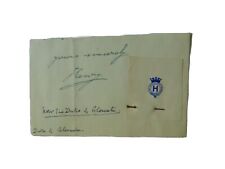
"Duke of Gloucester" Prince Henry Hand Signed 3X5 Card $279.99
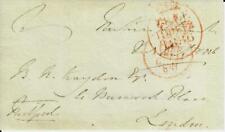
"6th Duke of Bedford" John Russell Hand Signed Free Frank Dated 1836 $279.99
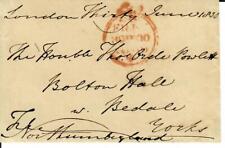
"3rd Duke of Northumberland" Hugh Percy Hand Signed Free Frank $139.99
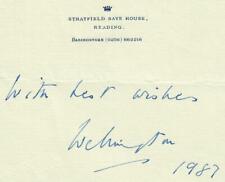
"8th Duke of Wellington" Valerian Wellesley Signed Letterhead $349.99
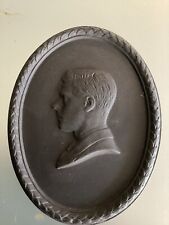
ROYALTY -“DUKE OF WINDSOR” BLACK MEDALLION 1894-1972 A MEMORIAL MEDALLION $85.00
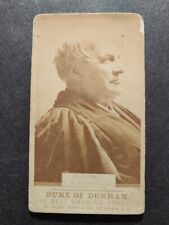
1888 N146 DUKE OF DURHAM ACTRESSES AND CELEBRITIES, SAMUEL MILLER, SUPREME COURT $199.95

"11th Duke of Devonshire" Andrew & Sopia Cavendish Signed 4X6 Card Todd Mueller $489.99
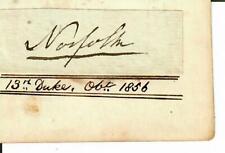
RARE "13th Duke of Norfolk" Henry Howard Clipped Signature $279.99
|